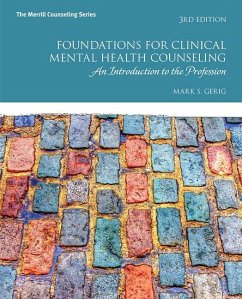- Broschiertes Buch
- Merkliste
- Auf die Merkliste
- Bewerten Bewerten
- Teilen
- Produkt teilen
- Produkterinnerung
- Produkterinnerung
For courses in Community / Agency Counseling. An authoritative, fresh look at the clinical mental health counseling profession in its contemporary environment. Mark Gerig's Foundations of Clinical Mental Health Counseling gives readers a fresh perspective on today's clinical mental health counseling profession that is both practical and academically informed. Drawing on his experience as a counselor educator, practitioner, supervisor and manager in agency and behavioral health settings, as well as on his leadership positions in professional associations, the author shows readers what it truly…mehr
Andere Kunden interessierten sich auch für
![Anti-Racist Ally Anti-Racist Ally]() Sophie WilliamsAnti-Racist Ally9,99 €
Sophie WilliamsAnti-Racist Ally9,99 €![Anti-Racist Ally Anti-Racist Ally]() Sophie WilliamsAnti-Racist Ally19,99 €
Sophie WilliamsAnti-Racist Ally19,99 €![Clinical Mental Health Counseling Clinical Mental Health Counseling]() Richard D ParsonsClinical Mental Health Counseling97,99 €
Richard D ParsonsClinical Mental Health Counseling97,99 €![Motivational Interviewing in Clinical Mental Health Counseling Motivational Interviewing in Clinical Mental Health Counseling]() Todd F. Lewis (USA North Dakota State University)Motivational Interviewing in Clinical Mental Health Counseling63,99 €
Todd F. Lewis (USA North Dakota State University)Motivational Interviewing in Clinical Mental Health Counseling63,99 €![Social Foundations of Thought and Action Social Foundations of Thought and Action]() Albert BanduraSocial Foundations of Thought and Action284,99 €
Albert BanduraSocial Foundations of Thought and Action284,99 €![The Art of Loving The Art of Loving]() Erich FrommThe Art of Loving9,99 €
Erich FrommThe Art of Loving9,99 €![She She]() Robert A. JohnsonShe15,99 €
Robert A. JohnsonShe15,99 €-
-
-
For courses in Community / Agency Counseling. An authoritative, fresh look at the clinical mental health counseling profession in its contemporary environment. Mark Gerig's Foundations of Clinical Mental Health Counseling gives readers a fresh perspective on today's clinical mental health counseling profession that is both practical and academically informed. Drawing on his experience as a counselor educator, practitioner, supervisor and manager in agency and behavioral health settings, as well as on his leadership positions in professional associations, the author shows readers what it truly means to be a relevant clinical mental health counselor who delivers effective treatment in an ever-changing contemporary context. With the goals of helping current and future counselors ensure that they are helpful to their clients, marketable to potential employers, and relevant voices in front of stakeholders or public policymakers, Dr. Gerig presents a well-informed description of pertinent settings, public policies, and trends. The new edition includes new applications, expanded information, and a wealth of new content. Also available with MyLab Counseling This title is also available with MyLab™ Counseling—an online homework, tutorial, and assessment program designed to work with the text to engage students and improve results. Within its structured environment, students see key concepts demonstrated through video clips, practice what they learn, test their understanding, and receive feedback to guide their learning and ensure they master key learning outcomes.
Hinweis: Dieser Artikel kann nur an eine deutsche Lieferadresse ausgeliefert werden.
Hinweis: Dieser Artikel kann nur an eine deutsche Lieferadresse ausgeliefert werden.
Produktdetails
- Produktdetails
- Verlag: Pearson Education (US)
- 3 ed
- Seitenzahl: 368
- Erscheinungstermin: 25. Dezember 2017
- Englisch
- Abmessung: 187mm x 232mm x 22mm
- Gewicht: 632g
- ISBN-13: 9780134384771
- ISBN-10: 0134384776
- Artikelnr.: 47260908
- Herstellerkennzeichnung
- Libri GmbH
- Europaallee 1
- 36244 Bad Hersfeld
- gpsr@libri.de
- Verlag: Pearson Education (US)
- 3 ed
- Seitenzahl: 368
- Erscheinungstermin: 25. Dezember 2017
- Englisch
- Abmessung: 187mm x 232mm x 22mm
- Gewicht: 632g
- ISBN-13: 9780134384771
- ISBN-10: 0134384776
- Artikelnr.: 47260908
- Herstellerkennzeichnung
- Libri GmbH
- Europaallee 1
- 36244 Bad Hersfeld
- gpsr@libri.de
Mark S. Gerig is Professor of Counseling and Chair in the Division of Graduate Counseling at Indiana Wesleyan University, located in Marion and Indianapolis, Indiana. He is a Licensed Mental Health Counselor and Licensed Psychologist with over 30 years of experience in professional counseling and counselor education. Mark has previously served as Manager of Crisis and Elderly Services at Hiawatha Behavioral Health, Sault Ste. Marie, Michigan, and as a sessional professor of psychology at Algoma University, Sault Ste. Marie, Ontario, Canada. Throughout these years, he has also provided counseling and consultation services to individuals, families, and organizations. Dr. Gerig has been a leader in state and national organizations. He presently serves on the Diplomate Committee of the American Mental Health Counselors Association. Mark has previously served in the roles of President and Chair of Professional Development in the Indiana Mental Health of the Indiana Mental Health Counseling Association and Mental Health Counseling Representative for the Indiana Counseling Association. In recognition of Dr. Gerig’s professional service, he was named recipient of the 2005 American Mental Health Counselors Association Counselor Educator of the Year and recipient of the Mental Health Counselor of the Year Award by the Indiana Counseling Association (2003). Dr. Gerig lives near Marion, Indiana with his wife, Michelle. Their son, Brandon, is a fish biologist and completing doctoral studies at the University of Notre Dame. Their daughter, Laurén is a professional painter and is completing her Master of Fine Arts at Michigan State University. In addition to his professional activities, Mark considers the family cottage near Iron Bridge, Ontario as a second home and enjoys hiking, fishing, gardening, and ice hockey.
Brief Table of Contents
Chapter 1 — What is a Mental Health or Professional Counselor?
Chapter 2 — The Clinical Mental Health Counseling Profession in Historical
Perspective
Chapter 3 — Theoretical Foundations for Clinical Mental Health Counselors
Chapter 4 — Traditional and Contemporary Theories of Counseling
Chapter 5 — Education, Licensure, and Certification
Chapter 6 — Ethical and Legal Issues in Clinical Mental Health Counseling
Chapter 7 — The Practice of Clinical Mental Health Counseling: What We Do
Chapter 8 — Contexts for Professional Practice: Where Clinical Mental
Health Counselors Work
Chapter 9 — Appraisal and Research in the Practice of Clinical Mental
Health Counseling
Chapter 10 — Professional Practice in Multicultural Contexts
Chapter 11 — Managed Care and Third-Party Reimbursement
Chapter 12 — Community Mental Health: Program Development, Evaluation, and
Management
Chapter 13 — The Future of Clinical Mental Health Counseling
Appendix A — Professional Associations
Appendix B — Selected Professional Training Institutes
Appendix C — State Licensure Boards
Index
Detailed Table of Contents
Chapter 1- What Is a Mental Health or Professional Counselor?
What is a Counselor? Enter a Land of Confusion!
What It Means to be a Clinical Mental Health or Professional Counselor:
Some Helpful Definitions
Relevant Professional Organizations
Other Specialties Within the Counseling Profession
Addictions Counseling
Career Counseling
College Counseling
Gerontological Counseling
Couples and Family Counseling
Rehabilitation Counseling
School Counseling
Clinical Mental Health Counseling and the Allied Mental Health Professions
Conclusion: The Process of Consolidating Professional Identity
Chapter 2 - The Clinical Mental Health Counseling Profession in Historical
Perspective
Early Views and Treatment of Mental Health and Illness
The Emergence of Psychiatry
Roots of the Counseling-Related Professions
Movement Toward the Professionalization of Counseling
The Private Practice of Psychology
The Child Guidance Movement
Carl Rogers and Non-Directive Counseling
Marriage and Family Counseling
Rapid Expansion of Assessment and Increase Sophistication of Vocational
Counseling
Post World War II and the Veterans Administration
The Influence of Professional Organizations
The Professionalization and Expansion of Mental Health Counseling
Problems in the Mental Health System
Increased Effectiveness of Psychopharmacological Interventions
Innovations in Counseling Theories and Techniques
Limited Availability of and Access to Community-Based Services
The Community Mental Health Centers Act of 1963
Emergence of Mental Health Counseling
Licensure of Mental Health and Professional Counselors
The Consolidation of the Mental Health Counseling Profession
Changing Roles, Tools, and Contexts: The Mental Health Professions Move
Into the 21st Century
Application of Technology
Influence of Positive Psychology and Research into Wellness
Response to Natural and Human-Made Disasters
Conclusion
Discussion Questions
Suggested Activities
References
Chapter 3 - Theoretical Foundations for Clinical Mental Health Counselors
Theory and Personal Characteristics of the Counselor
Self-Schema
Worldview
Interpersonal Style
Client Motivation and the Process of Change: The Transtheoretical Model
The Role of Theory in Counseling
Foundational Theories for Clinical Mental Health Counselors
Theories of Human Development
Ecological Perspective
Theories of Mental Health and Prevention of Mental Illness
Approaches to Mental Health Promotion
Prevention in the Context of Promoting Mental Health
Conclusion: The Clinical Mental Health Counseling Paradigm
Discussion Questions
Suggested Activities
References
Chapter 4 - Traditional and Contemporary Theories of Counseling
Traditional Theories of Counseling and Psychotherapy
Psychoanalysis
Object Relations
Individual Psychology (Adlerian Therapy)
Behavior Therapy
Cognitive Approaches
Humanistic Therapies and Existential Theory
Narrative Therapy
Feminist Therapy
Family Therapy
Conclusion
Discussion Questions
Suggested Activities
References
Chapter 5 — Education, Licensure, and Certification
Academic Preparation of Clinical Mental Health Counselors
The CACREP Model for the Training of Clinical Mental Health Counselors
Common Core Curriculum
CACREP Standards for Clinical Mental Health Counseling Programs
Foundations
Contextual Dimensions
Practice
Professional Practice Standards in the Training of Clinical Mental Health
Counselors
The Credentialing of Clinical Mental Health Counselors
Registry
Certification
Licensure
Contemporary Issues in Education and Credentialing of Counselors
Licensure for Clinical Mental Health Counselors in All 50 States: What
Comes Next?
Portability
Controversies and Growing Pains
Conclusion
Discussion Questions
Suggested Activities
References
Chapter 6 - Ethical and Legal Issues in Clinical Mental Health Counseling
The Significance of Ethical Codes and the Law
The Relationship Between the Law and Codes of Ethics
Foundational Principles of Ethical Codes
Codes of Ethics
The Role of the ACA Ethics Committee and Investigation of Alleged
Violations
Specific Ethical and Legal Issues
Competence and Scope of Practice
Informed Consent: Client’s Rights and Responsibilities
Confidentiality and Privileged Communication
Health Insurance Portability and Accountability Act
Protection of Clients or Others from Harm
Taking Action When Child or Elder Abuse or Neglect Is Suspected
Protecting Clients Who Pose a Danger to Themselves
Clients Who Pose a Danger to Others
Clients with Communicable Diseases Whose Behavior Poses a Danger to Others
Professional Boundaries and Dual Relationships
Application of Technology in Counseling
Conclusion
Discussion Questions
Suggested Activities
References
Chapter 7 — The Practice of Clinical Mental Health Counseling: What We Do
Application of the Clinical Mental Health Counseling Paradigm
Stages of Helping
Establishing the Relationship
Assessing or Defining the Presenting Problem
The Initial Interview and Biopsychosocial Assessment
Mental Status Exam
Diagnosis: DSM-V and the ICD-10
Identifying and Setting Goals
Choosing and Implementing Interventions
Planning and Introducing Termination and Follow-Up
Modalities of Intervention
Individual Counseling
Group Work
Family Counseling
Consultation
Advocacy
Contextual Trends Influencing Treatment Processes
The Post-deinstitutionalization Era
Least Restrictive Treatment
Evidence-Based Treatment
Recovery and the Consumer Movement
Conclusion
Discussion Questions
Suggested Activities
References
Chapter 8 — Contexts for Professional Practice: Where Clinical Mental
Health Counselors Work
Clinical Mental Health Counselors on the Job: Special Populations
Homelessness and Mental Health
Treating Persons with Severe and Persistent Mental Illness.
Treating Clients with Co-Occurring Mental Illness and Substance Use
Disorders
Community Mental Health and Corrections
Community Mental Health, Disaster Response, and Emergency Management
Systems
Disaster Response
Trauma-Informed Care
Emergency Management Systems
Clinical Mental Health Counselors on the Job: Selected Work Settings
Agency/Community Mental Health Centers
Private Practice
Substance Use Treatment Programs
Small College Counseling Center
University Health Service
In the Barn: Equine Therapy
Home-based Therapy
Integrated Behavioral Health in Primary Healthcare Settings
Conclusion
Discussion Questions
Suggested Activities
References
Chapter 9 — Appraisal and Research in the Practice of Clinical Mental
Health Counseling
Appraisal
The Use of Tests
Key Concepts and Principles in Appraisal
Classical True-Score Theory
Reliability
Validity
Standardization
Categories of Appraisal Techniques
Intelligence Tests
Achievement Tests
Aptitude Tests and Interest Inventories
Personality Tests
Self-Report Clinical Scales
Neuropsychological Screening and Assessment
Ethical Practice in Appraisal
Test Selection
Test Administration
Test Interpretation
Test Reporting
Research
Key Concepts and Principles in Research
Sampling
Validity
Reliability
Operational Definitions
Specific Models of Research Design
Longitudinal and Cross-Sectional Designs
Direct Observation
Survey Methods
Correlational Methods
Experimental Methods
Within Subjects Designs
Qualitative Methods
Meta-Analysis
Statistical Analysis
Ethical Practice in Research
Conclusion
Discussion Questions
Suggested Activities
References
Chapter 10 - Professional Practice in Multicultural Contexts
Diversity and Multiculturalism in America
Multiculturalism as the Fourth Force in Counseling
Key Definitions and Concepts
Barriers to Effective Multicultural Counseling
Resistance
Cultural Encapsulation
Misapplication of Traditional Theories and Techniques
Systemic Barriers Within Counseling Delivery Systems
Language Barriers and Miscommunication
Mistrust
Foundational Principles in Multicultural Counseling
Activation of Schemas and Confirmation Bias
Between- and Within-Group Differences
Racial/Cultural Identity Development Theory
Acculturation
Multiple Identities
Multiple Heritage Identity Development
The Culturally Competent Counselor
Conclusion
Chapter 11 - Managed Care and Third-Party Reimbursement
The Context of Managed Care and Its Development Context
Financial Risk and the Rise of Insurance Companies
The Push Toward Managed Health Care
What Is Managed Care?
Procedures for Reducing Utilization
Pretreatment Authorization of Treatment
Concurrent Utilization Reviews
Incentives for Efficient Providers
Increased Employee and User/Client Cost Sharing
Procedures for Controlling Price Per Unit
Capitation
Less Expensive but Equally Effective Treatment Approaches
Retrospective Claims Reviews
Responses of Mental Health Practitioners to the Contemporary Economic
Context
Conclusion: Surviving in the Era of Managed Care
Discussion Questions
Suggested Activities
References
Chapter 12 - Community Mental Health: Program Development, Evaluation, and
Management
Historical Background: Community Mental Health in the United States
A Model of Mental Health Delivery Systems
Assessment of the Needs and Wants of Service Recipients
Mission
Goals, Objectives, and Program Outputs
Programs
Working Knowledge, Skills, and Resource Supports
Environmental Supports: Technology and Facility
Program Evaluation
Funding Programs Through Grants
Program Supervision, Management, and Leadership
Conclusion
Discussion Questions
Suggested Activities
References
Chapter 13 - The Future of Clinical Mental Health Counseling
Current Factors Influencing the Profession
Professional Credentialing
Consolidation of Professional Identity
Political and Socio-Economic Climate
New Models and Delivery Systems
Contemporary Trends in the Application of Counseling Theory
Spirituality in Clinical Mental Health Counseling
Biologicalization of Psychopathology and Wellness: Psychopharmacology,
Neuroscience, and Neurocounseling
Economic Context and Application of Theory in Professional Practice
Strengths of the Contemporary Mental Health Counseling Profession
The Struggles of the Contemporary Mental Health Counseling Profession
How to Live Out Who We Are: Enacting the Clinical Mental Health Counseling
Paradigm
Conclusion
Discussion Questions
Suggested Activities
References
Chapter 1 — What is a Mental Health or Professional Counselor?
Chapter 2 — The Clinical Mental Health Counseling Profession in Historical
Perspective
Chapter 3 — Theoretical Foundations for Clinical Mental Health Counselors
Chapter 4 — Traditional and Contemporary Theories of Counseling
Chapter 5 — Education, Licensure, and Certification
Chapter 6 — Ethical and Legal Issues in Clinical Mental Health Counseling
Chapter 7 — The Practice of Clinical Mental Health Counseling: What We Do
Chapter 8 — Contexts for Professional Practice: Where Clinical Mental
Health Counselors Work
Chapter 9 — Appraisal and Research in the Practice of Clinical Mental
Health Counseling
Chapter 10 — Professional Practice in Multicultural Contexts
Chapter 11 — Managed Care and Third-Party Reimbursement
Chapter 12 — Community Mental Health: Program Development, Evaluation, and
Management
Chapter 13 — The Future of Clinical Mental Health Counseling
Appendix A — Professional Associations
Appendix B — Selected Professional Training Institutes
Appendix C — State Licensure Boards
Index
Detailed Table of Contents
Chapter 1- What Is a Mental Health or Professional Counselor?
What is a Counselor? Enter a Land of Confusion!
What It Means to be a Clinical Mental Health or Professional Counselor:
Some Helpful Definitions
Relevant Professional Organizations
Other Specialties Within the Counseling Profession
Addictions Counseling
Career Counseling
College Counseling
Gerontological Counseling
Couples and Family Counseling
Rehabilitation Counseling
School Counseling
Clinical Mental Health Counseling and the Allied Mental Health Professions
Conclusion: The Process of Consolidating Professional Identity
Chapter 2 - The Clinical Mental Health Counseling Profession in Historical
Perspective
Early Views and Treatment of Mental Health and Illness
The Emergence of Psychiatry
Roots of the Counseling-Related Professions
Movement Toward the Professionalization of Counseling
The Private Practice of Psychology
The Child Guidance Movement
Carl Rogers and Non-Directive Counseling
Marriage and Family Counseling
Rapid Expansion of Assessment and Increase Sophistication of Vocational
Counseling
Post World War II and the Veterans Administration
The Influence of Professional Organizations
The Professionalization and Expansion of Mental Health Counseling
Problems in the Mental Health System
Increased Effectiveness of Psychopharmacological Interventions
Innovations in Counseling Theories and Techniques
Limited Availability of and Access to Community-Based Services
The Community Mental Health Centers Act of 1963
Emergence of Mental Health Counseling
Licensure of Mental Health and Professional Counselors
The Consolidation of the Mental Health Counseling Profession
Changing Roles, Tools, and Contexts: The Mental Health Professions Move
Into the 21st Century
Application of Technology
Influence of Positive Psychology and Research into Wellness
Response to Natural and Human-Made Disasters
Conclusion
Discussion Questions
Suggested Activities
References
Chapter 3 - Theoretical Foundations for Clinical Mental Health Counselors
Theory and Personal Characteristics of the Counselor
Self-Schema
Worldview
Interpersonal Style
Client Motivation and the Process of Change: The Transtheoretical Model
The Role of Theory in Counseling
Foundational Theories for Clinical Mental Health Counselors
Theories of Human Development
Ecological Perspective
Theories of Mental Health and Prevention of Mental Illness
Approaches to Mental Health Promotion
Prevention in the Context of Promoting Mental Health
Conclusion: The Clinical Mental Health Counseling Paradigm
Discussion Questions
Suggested Activities
References
Chapter 4 - Traditional and Contemporary Theories of Counseling
Traditional Theories of Counseling and Psychotherapy
Psychoanalysis
Object Relations
Individual Psychology (Adlerian Therapy)
Behavior Therapy
Cognitive Approaches
Humanistic Therapies and Existential Theory
Narrative Therapy
Feminist Therapy
Family Therapy
Conclusion
Discussion Questions
Suggested Activities
References
Chapter 5 — Education, Licensure, and Certification
Academic Preparation of Clinical Mental Health Counselors
The CACREP Model for the Training of Clinical Mental Health Counselors
Common Core Curriculum
CACREP Standards for Clinical Mental Health Counseling Programs
Foundations
Contextual Dimensions
Practice
Professional Practice Standards in the Training of Clinical Mental Health
Counselors
The Credentialing of Clinical Mental Health Counselors
Registry
Certification
Licensure
Contemporary Issues in Education and Credentialing of Counselors
Licensure for Clinical Mental Health Counselors in All 50 States: What
Comes Next?
Portability
Controversies and Growing Pains
Conclusion
Discussion Questions
Suggested Activities
References
Chapter 6 - Ethical and Legal Issues in Clinical Mental Health Counseling
The Significance of Ethical Codes and the Law
The Relationship Between the Law and Codes of Ethics
Foundational Principles of Ethical Codes
Codes of Ethics
The Role of the ACA Ethics Committee and Investigation of Alleged
Violations
Specific Ethical and Legal Issues
Competence and Scope of Practice
Informed Consent: Client’s Rights and Responsibilities
Confidentiality and Privileged Communication
Health Insurance Portability and Accountability Act
Protection of Clients or Others from Harm
Taking Action When Child or Elder Abuse or Neglect Is Suspected
Protecting Clients Who Pose a Danger to Themselves
Clients Who Pose a Danger to Others
Clients with Communicable Diseases Whose Behavior Poses a Danger to Others
Professional Boundaries and Dual Relationships
Application of Technology in Counseling
Conclusion
Discussion Questions
Suggested Activities
References
Chapter 7 — The Practice of Clinical Mental Health Counseling: What We Do
Application of the Clinical Mental Health Counseling Paradigm
Stages of Helping
Establishing the Relationship
Assessing or Defining the Presenting Problem
The Initial Interview and Biopsychosocial Assessment
Mental Status Exam
Diagnosis: DSM-V and the ICD-10
Identifying and Setting Goals
Choosing and Implementing Interventions
Planning and Introducing Termination and Follow-Up
Modalities of Intervention
Individual Counseling
Group Work
Family Counseling
Consultation
Advocacy
Contextual Trends Influencing Treatment Processes
The Post-deinstitutionalization Era
Least Restrictive Treatment
Evidence-Based Treatment
Recovery and the Consumer Movement
Conclusion
Discussion Questions
Suggested Activities
References
Chapter 8 — Contexts for Professional Practice: Where Clinical Mental
Health Counselors Work
Clinical Mental Health Counselors on the Job: Special Populations
Homelessness and Mental Health
Treating Persons with Severe and Persistent Mental Illness.
Treating Clients with Co-Occurring Mental Illness and Substance Use
Disorders
Community Mental Health and Corrections
Community Mental Health, Disaster Response, and Emergency Management
Systems
Disaster Response
Trauma-Informed Care
Emergency Management Systems
Clinical Mental Health Counselors on the Job: Selected Work Settings
Agency/Community Mental Health Centers
Private Practice
Substance Use Treatment Programs
Small College Counseling Center
University Health Service
In the Barn: Equine Therapy
Home-based Therapy
Integrated Behavioral Health in Primary Healthcare Settings
Conclusion
Discussion Questions
Suggested Activities
References
Chapter 9 — Appraisal and Research in the Practice of Clinical Mental
Health Counseling
Appraisal
The Use of Tests
Key Concepts and Principles in Appraisal
Classical True-Score Theory
Reliability
Validity
Standardization
Categories of Appraisal Techniques
Intelligence Tests
Achievement Tests
Aptitude Tests and Interest Inventories
Personality Tests
Self-Report Clinical Scales
Neuropsychological Screening and Assessment
Ethical Practice in Appraisal
Test Selection
Test Administration
Test Interpretation
Test Reporting
Research
Key Concepts and Principles in Research
Sampling
Validity
Reliability
Operational Definitions
Specific Models of Research Design
Longitudinal and Cross-Sectional Designs
Direct Observation
Survey Methods
Correlational Methods
Experimental Methods
Within Subjects Designs
Qualitative Methods
Meta-Analysis
Statistical Analysis
Ethical Practice in Research
Conclusion
Discussion Questions
Suggested Activities
References
Chapter 10 - Professional Practice in Multicultural Contexts
Diversity and Multiculturalism in America
Multiculturalism as the Fourth Force in Counseling
Key Definitions and Concepts
Barriers to Effective Multicultural Counseling
Resistance
Cultural Encapsulation
Misapplication of Traditional Theories and Techniques
Systemic Barriers Within Counseling Delivery Systems
Language Barriers and Miscommunication
Mistrust
Foundational Principles in Multicultural Counseling
Activation of Schemas and Confirmation Bias
Between- and Within-Group Differences
Racial/Cultural Identity Development Theory
Acculturation
Multiple Identities
Multiple Heritage Identity Development
The Culturally Competent Counselor
Conclusion
Chapter 11 - Managed Care and Third-Party Reimbursement
The Context of Managed Care and Its Development Context
Financial Risk and the Rise of Insurance Companies
The Push Toward Managed Health Care
What Is Managed Care?
Procedures for Reducing Utilization
Pretreatment Authorization of Treatment
Concurrent Utilization Reviews
Incentives for Efficient Providers
Increased Employee and User/Client Cost Sharing
Procedures for Controlling Price Per Unit
Capitation
Less Expensive but Equally Effective Treatment Approaches
Retrospective Claims Reviews
Responses of Mental Health Practitioners to the Contemporary Economic
Context
Conclusion: Surviving in the Era of Managed Care
Discussion Questions
Suggested Activities
References
Chapter 12 - Community Mental Health: Program Development, Evaluation, and
Management
Historical Background: Community Mental Health in the United States
A Model of Mental Health Delivery Systems
Assessment of the Needs and Wants of Service Recipients
Mission
Goals, Objectives, and Program Outputs
Programs
Working Knowledge, Skills, and Resource Supports
Environmental Supports: Technology and Facility
Program Evaluation
Funding Programs Through Grants
Program Supervision, Management, and Leadership
Conclusion
Discussion Questions
Suggested Activities
References
Chapter 13 - The Future of Clinical Mental Health Counseling
Current Factors Influencing the Profession
Professional Credentialing
Consolidation of Professional Identity
Political and Socio-Economic Climate
New Models and Delivery Systems
Contemporary Trends in the Application of Counseling Theory
Spirituality in Clinical Mental Health Counseling
Biologicalization of Psychopathology and Wellness: Psychopharmacology,
Neuroscience, and Neurocounseling
Economic Context and Application of Theory in Professional Practice
Strengths of the Contemporary Mental Health Counseling Profession
The Struggles of the Contemporary Mental Health Counseling Profession
How to Live Out Who We Are: Enacting the Clinical Mental Health Counseling
Paradigm
Conclusion
Discussion Questions
Suggested Activities
References
Brief Table of Contents
Chapter 1 — What is a Mental Health or Professional Counselor?
Chapter 2 — The Clinical Mental Health Counseling Profession in Historical
Perspective
Chapter 3 — Theoretical Foundations for Clinical Mental Health Counselors
Chapter 4 — Traditional and Contemporary Theories of Counseling
Chapter 5 — Education, Licensure, and Certification
Chapter 6 — Ethical and Legal Issues in Clinical Mental Health Counseling
Chapter 7 — The Practice of Clinical Mental Health Counseling: What We Do
Chapter 8 — Contexts for Professional Practice: Where Clinical Mental
Health Counselors Work
Chapter 9 — Appraisal and Research in the Practice of Clinical Mental
Health Counseling
Chapter 10 — Professional Practice in Multicultural Contexts
Chapter 11 — Managed Care and Third-Party Reimbursement
Chapter 12 — Community Mental Health: Program Development, Evaluation, and
Management
Chapter 13 — The Future of Clinical Mental Health Counseling
Appendix A — Professional Associations
Appendix B — Selected Professional Training Institutes
Appendix C — State Licensure Boards
Index
Detailed Table of Contents
Chapter 1- What Is a Mental Health or Professional Counselor?
What is a Counselor? Enter a Land of Confusion!
What It Means to be a Clinical Mental Health or Professional Counselor:
Some Helpful Definitions
Relevant Professional Organizations
Other Specialties Within the Counseling Profession
Addictions Counseling
Career Counseling
College Counseling
Gerontological Counseling
Couples and Family Counseling
Rehabilitation Counseling
School Counseling
Clinical Mental Health Counseling and the Allied Mental Health Professions
Conclusion: The Process of Consolidating Professional Identity
Chapter 2 - The Clinical Mental Health Counseling Profession in Historical
Perspective
Early Views and Treatment of Mental Health and Illness
The Emergence of Psychiatry
Roots of the Counseling-Related Professions
Movement Toward the Professionalization of Counseling
The Private Practice of Psychology
The Child Guidance Movement
Carl Rogers and Non-Directive Counseling
Marriage and Family Counseling
Rapid Expansion of Assessment and Increase Sophistication of Vocational
Counseling
Post World War II and the Veterans Administration
The Influence of Professional Organizations
The Professionalization and Expansion of Mental Health Counseling
Problems in the Mental Health System
Increased Effectiveness of Psychopharmacological Interventions
Innovations in Counseling Theories and Techniques
Limited Availability of and Access to Community-Based Services
The Community Mental Health Centers Act of 1963
Emergence of Mental Health Counseling
Licensure of Mental Health and Professional Counselors
The Consolidation of the Mental Health Counseling Profession
Changing Roles, Tools, and Contexts: The Mental Health Professions Move
Into the 21st Century
Application of Technology
Influence of Positive Psychology and Research into Wellness
Response to Natural and Human-Made Disasters
Conclusion
Discussion Questions
Suggested Activities
References
Chapter 3 - Theoretical Foundations for Clinical Mental Health Counselors
Theory and Personal Characteristics of the Counselor
Self-Schema
Worldview
Interpersonal Style
Client Motivation and the Process of Change: The Transtheoretical Model
The Role of Theory in Counseling
Foundational Theories for Clinical Mental Health Counselors
Theories of Human Development
Ecological Perspective
Theories of Mental Health and Prevention of Mental Illness
Approaches to Mental Health Promotion
Prevention in the Context of Promoting Mental Health
Conclusion: The Clinical Mental Health Counseling Paradigm
Discussion Questions
Suggested Activities
References
Chapter 4 - Traditional and Contemporary Theories of Counseling
Traditional Theories of Counseling and Psychotherapy
Psychoanalysis
Object Relations
Individual Psychology (Adlerian Therapy)
Behavior Therapy
Cognitive Approaches
Humanistic Therapies and Existential Theory
Narrative Therapy
Feminist Therapy
Family Therapy
Conclusion
Discussion Questions
Suggested Activities
References
Chapter 5 — Education, Licensure, and Certification
Academic Preparation of Clinical Mental Health Counselors
The CACREP Model for the Training of Clinical Mental Health Counselors
Common Core Curriculum
CACREP Standards for Clinical Mental Health Counseling Programs
Foundations
Contextual Dimensions
Practice
Professional Practice Standards in the Training of Clinical Mental Health
Counselors
The Credentialing of Clinical Mental Health Counselors
Registry
Certification
Licensure
Contemporary Issues in Education and Credentialing of Counselors
Licensure for Clinical Mental Health Counselors in All 50 States: What
Comes Next?
Portability
Controversies and Growing Pains
Conclusion
Discussion Questions
Suggested Activities
References
Chapter 6 - Ethical and Legal Issues in Clinical Mental Health Counseling
The Significance of Ethical Codes and the Law
The Relationship Between the Law and Codes of Ethics
Foundational Principles of Ethical Codes
Codes of Ethics
The Role of the ACA Ethics Committee and Investigation of Alleged
Violations
Specific Ethical and Legal Issues
Competence and Scope of Practice
Informed Consent: Client’s Rights and Responsibilities
Confidentiality and Privileged Communication
Health Insurance Portability and Accountability Act
Protection of Clients or Others from Harm
Taking Action When Child or Elder Abuse or Neglect Is Suspected
Protecting Clients Who Pose a Danger to Themselves
Clients Who Pose a Danger to Others
Clients with Communicable Diseases Whose Behavior Poses a Danger to Others
Professional Boundaries and Dual Relationships
Application of Technology in Counseling
Conclusion
Discussion Questions
Suggested Activities
References
Chapter 7 — The Practice of Clinical Mental Health Counseling: What We Do
Application of the Clinical Mental Health Counseling Paradigm
Stages of Helping
Establishing the Relationship
Assessing or Defining the Presenting Problem
The Initial Interview and Biopsychosocial Assessment
Mental Status Exam
Diagnosis: DSM-V and the ICD-10
Identifying and Setting Goals
Choosing and Implementing Interventions
Planning and Introducing Termination and Follow-Up
Modalities of Intervention
Individual Counseling
Group Work
Family Counseling
Consultation
Advocacy
Contextual Trends Influencing Treatment Processes
The Post-deinstitutionalization Era
Least Restrictive Treatment
Evidence-Based Treatment
Recovery and the Consumer Movement
Conclusion
Discussion Questions
Suggested Activities
References
Chapter 8 — Contexts for Professional Practice: Where Clinical Mental
Health Counselors Work
Clinical Mental Health Counselors on the Job: Special Populations
Homelessness and Mental Health
Treating Persons with Severe and Persistent Mental Illness.
Treating Clients with Co-Occurring Mental Illness and Substance Use
Disorders
Community Mental Health and Corrections
Community Mental Health, Disaster Response, and Emergency Management
Systems
Disaster Response
Trauma-Informed Care
Emergency Management Systems
Clinical Mental Health Counselors on the Job: Selected Work Settings
Agency/Community Mental Health Centers
Private Practice
Substance Use Treatment Programs
Small College Counseling Center
University Health Service
In the Barn: Equine Therapy
Home-based Therapy
Integrated Behavioral Health in Primary Healthcare Settings
Conclusion
Discussion Questions
Suggested Activities
References
Chapter 9 — Appraisal and Research in the Practice of Clinical Mental
Health Counseling
Appraisal
The Use of Tests
Key Concepts and Principles in Appraisal
Classical True-Score Theory
Reliability
Validity
Standardization
Categories of Appraisal Techniques
Intelligence Tests
Achievement Tests
Aptitude Tests and Interest Inventories
Personality Tests
Self-Report Clinical Scales
Neuropsychological Screening and Assessment
Ethical Practice in Appraisal
Test Selection
Test Administration
Test Interpretation
Test Reporting
Research
Key Concepts and Principles in Research
Sampling
Validity
Reliability
Operational Definitions
Specific Models of Research Design
Longitudinal and Cross-Sectional Designs
Direct Observation
Survey Methods
Correlational Methods
Experimental Methods
Within Subjects Designs
Qualitative Methods
Meta-Analysis
Statistical Analysis
Ethical Practice in Research
Conclusion
Discussion Questions
Suggested Activities
References
Chapter 10 - Professional Practice in Multicultural Contexts
Diversity and Multiculturalism in America
Multiculturalism as the Fourth Force in Counseling
Key Definitions and Concepts
Barriers to Effective Multicultural Counseling
Resistance
Cultural Encapsulation
Misapplication of Traditional Theories and Techniques
Systemic Barriers Within Counseling Delivery Systems
Language Barriers and Miscommunication
Mistrust
Foundational Principles in Multicultural Counseling
Activation of Schemas and Confirmation Bias
Between- and Within-Group Differences
Racial/Cultural Identity Development Theory
Acculturation
Multiple Identities
Multiple Heritage Identity Development
The Culturally Competent Counselor
Conclusion
Chapter 11 - Managed Care and Third-Party Reimbursement
The Context of Managed Care and Its Development Context
Financial Risk and the Rise of Insurance Companies
The Push Toward Managed Health Care
What Is Managed Care?
Procedures for Reducing Utilization
Pretreatment Authorization of Treatment
Concurrent Utilization Reviews
Incentives for Efficient Providers
Increased Employee and User/Client Cost Sharing
Procedures for Controlling Price Per Unit
Capitation
Less Expensive but Equally Effective Treatment Approaches
Retrospective Claims Reviews
Responses of Mental Health Practitioners to the Contemporary Economic
Context
Conclusion: Surviving in the Era of Managed Care
Discussion Questions
Suggested Activities
References
Chapter 12 - Community Mental Health: Program Development, Evaluation, and
Management
Historical Background: Community Mental Health in the United States
A Model of Mental Health Delivery Systems
Assessment of the Needs and Wants of Service Recipients
Mission
Goals, Objectives, and Program Outputs
Programs
Working Knowledge, Skills, and Resource Supports
Environmental Supports: Technology and Facility
Program Evaluation
Funding Programs Through Grants
Program Supervision, Management, and Leadership
Conclusion
Discussion Questions
Suggested Activities
References
Chapter 13 - The Future of Clinical Mental Health Counseling
Current Factors Influencing the Profession
Professional Credentialing
Consolidation of Professional Identity
Political and Socio-Economic Climate
New Models and Delivery Systems
Contemporary Trends in the Application of Counseling Theory
Spirituality in Clinical Mental Health Counseling
Biologicalization of Psychopathology and Wellness: Psychopharmacology,
Neuroscience, and Neurocounseling
Economic Context and Application of Theory in Professional Practice
Strengths of the Contemporary Mental Health Counseling Profession
The Struggles of the Contemporary Mental Health Counseling Profession
How to Live Out Who We Are: Enacting the Clinical Mental Health Counseling
Paradigm
Conclusion
Discussion Questions
Suggested Activities
References
Chapter 1 — What is a Mental Health or Professional Counselor?
Chapter 2 — The Clinical Mental Health Counseling Profession in Historical
Perspective
Chapter 3 — Theoretical Foundations for Clinical Mental Health Counselors
Chapter 4 — Traditional and Contemporary Theories of Counseling
Chapter 5 — Education, Licensure, and Certification
Chapter 6 — Ethical and Legal Issues in Clinical Mental Health Counseling
Chapter 7 — The Practice of Clinical Mental Health Counseling: What We Do
Chapter 8 — Contexts for Professional Practice: Where Clinical Mental
Health Counselors Work
Chapter 9 — Appraisal and Research in the Practice of Clinical Mental
Health Counseling
Chapter 10 — Professional Practice in Multicultural Contexts
Chapter 11 — Managed Care and Third-Party Reimbursement
Chapter 12 — Community Mental Health: Program Development, Evaluation, and
Management
Chapter 13 — The Future of Clinical Mental Health Counseling
Appendix A — Professional Associations
Appendix B — Selected Professional Training Institutes
Appendix C — State Licensure Boards
Index
Detailed Table of Contents
Chapter 1- What Is a Mental Health or Professional Counselor?
What is a Counselor? Enter a Land of Confusion!
What It Means to be a Clinical Mental Health or Professional Counselor:
Some Helpful Definitions
Relevant Professional Organizations
Other Specialties Within the Counseling Profession
Addictions Counseling
Career Counseling
College Counseling
Gerontological Counseling
Couples and Family Counseling
Rehabilitation Counseling
School Counseling
Clinical Mental Health Counseling and the Allied Mental Health Professions
Conclusion: The Process of Consolidating Professional Identity
Chapter 2 - The Clinical Mental Health Counseling Profession in Historical
Perspective
Early Views and Treatment of Mental Health and Illness
The Emergence of Psychiatry
Roots of the Counseling-Related Professions
Movement Toward the Professionalization of Counseling
The Private Practice of Psychology
The Child Guidance Movement
Carl Rogers and Non-Directive Counseling
Marriage and Family Counseling
Rapid Expansion of Assessment and Increase Sophistication of Vocational
Counseling
Post World War II and the Veterans Administration
The Influence of Professional Organizations
The Professionalization and Expansion of Mental Health Counseling
Problems in the Mental Health System
Increased Effectiveness of Psychopharmacological Interventions
Innovations in Counseling Theories and Techniques
Limited Availability of and Access to Community-Based Services
The Community Mental Health Centers Act of 1963
Emergence of Mental Health Counseling
Licensure of Mental Health and Professional Counselors
The Consolidation of the Mental Health Counseling Profession
Changing Roles, Tools, and Contexts: The Mental Health Professions Move
Into the 21st Century
Application of Technology
Influence of Positive Psychology and Research into Wellness
Response to Natural and Human-Made Disasters
Conclusion
Discussion Questions
Suggested Activities
References
Chapter 3 - Theoretical Foundations for Clinical Mental Health Counselors
Theory and Personal Characteristics of the Counselor
Self-Schema
Worldview
Interpersonal Style
Client Motivation and the Process of Change: The Transtheoretical Model
The Role of Theory in Counseling
Foundational Theories for Clinical Mental Health Counselors
Theories of Human Development
Ecological Perspective
Theories of Mental Health and Prevention of Mental Illness
Approaches to Mental Health Promotion
Prevention in the Context of Promoting Mental Health
Conclusion: The Clinical Mental Health Counseling Paradigm
Discussion Questions
Suggested Activities
References
Chapter 4 - Traditional and Contemporary Theories of Counseling
Traditional Theories of Counseling and Psychotherapy
Psychoanalysis
Object Relations
Individual Psychology (Adlerian Therapy)
Behavior Therapy
Cognitive Approaches
Humanistic Therapies and Existential Theory
Narrative Therapy
Feminist Therapy
Family Therapy
Conclusion
Discussion Questions
Suggested Activities
References
Chapter 5 — Education, Licensure, and Certification
Academic Preparation of Clinical Mental Health Counselors
The CACREP Model for the Training of Clinical Mental Health Counselors
Common Core Curriculum
CACREP Standards for Clinical Mental Health Counseling Programs
Foundations
Contextual Dimensions
Practice
Professional Practice Standards in the Training of Clinical Mental Health
Counselors
The Credentialing of Clinical Mental Health Counselors
Registry
Certification
Licensure
Contemporary Issues in Education and Credentialing of Counselors
Licensure for Clinical Mental Health Counselors in All 50 States: What
Comes Next?
Portability
Controversies and Growing Pains
Conclusion
Discussion Questions
Suggested Activities
References
Chapter 6 - Ethical and Legal Issues in Clinical Mental Health Counseling
The Significance of Ethical Codes and the Law
The Relationship Between the Law and Codes of Ethics
Foundational Principles of Ethical Codes
Codes of Ethics
The Role of the ACA Ethics Committee and Investigation of Alleged
Violations
Specific Ethical and Legal Issues
Competence and Scope of Practice
Informed Consent: Client’s Rights and Responsibilities
Confidentiality and Privileged Communication
Health Insurance Portability and Accountability Act
Protection of Clients or Others from Harm
Taking Action When Child or Elder Abuse or Neglect Is Suspected
Protecting Clients Who Pose a Danger to Themselves
Clients Who Pose a Danger to Others
Clients with Communicable Diseases Whose Behavior Poses a Danger to Others
Professional Boundaries and Dual Relationships
Application of Technology in Counseling
Conclusion
Discussion Questions
Suggested Activities
References
Chapter 7 — The Practice of Clinical Mental Health Counseling: What We Do
Application of the Clinical Mental Health Counseling Paradigm
Stages of Helping
Establishing the Relationship
Assessing or Defining the Presenting Problem
The Initial Interview and Biopsychosocial Assessment
Mental Status Exam
Diagnosis: DSM-V and the ICD-10
Identifying and Setting Goals
Choosing and Implementing Interventions
Planning and Introducing Termination and Follow-Up
Modalities of Intervention
Individual Counseling
Group Work
Family Counseling
Consultation
Advocacy
Contextual Trends Influencing Treatment Processes
The Post-deinstitutionalization Era
Least Restrictive Treatment
Evidence-Based Treatment
Recovery and the Consumer Movement
Conclusion
Discussion Questions
Suggested Activities
References
Chapter 8 — Contexts for Professional Practice: Where Clinical Mental
Health Counselors Work
Clinical Mental Health Counselors on the Job: Special Populations
Homelessness and Mental Health
Treating Persons with Severe and Persistent Mental Illness.
Treating Clients with Co-Occurring Mental Illness and Substance Use
Disorders
Community Mental Health and Corrections
Community Mental Health, Disaster Response, and Emergency Management
Systems
Disaster Response
Trauma-Informed Care
Emergency Management Systems
Clinical Mental Health Counselors on the Job: Selected Work Settings
Agency/Community Mental Health Centers
Private Practice
Substance Use Treatment Programs
Small College Counseling Center
University Health Service
In the Barn: Equine Therapy
Home-based Therapy
Integrated Behavioral Health in Primary Healthcare Settings
Conclusion
Discussion Questions
Suggested Activities
References
Chapter 9 — Appraisal and Research in the Practice of Clinical Mental
Health Counseling
Appraisal
The Use of Tests
Key Concepts and Principles in Appraisal
Classical True-Score Theory
Reliability
Validity
Standardization
Categories of Appraisal Techniques
Intelligence Tests
Achievement Tests
Aptitude Tests and Interest Inventories
Personality Tests
Self-Report Clinical Scales
Neuropsychological Screening and Assessment
Ethical Practice in Appraisal
Test Selection
Test Administration
Test Interpretation
Test Reporting
Research
Key Concepts and Principles in Research
Sampling
Validity
Reliability
Operational Definitions
Specific Models of Research Design
Longitudinal and Cross-Sectional Designs
Direct Observation
Survey Methods
Correlational Methods
Experimental Methods
Within Subjects Designs
Qualitative Methods
Meta-Analysis
Statistical Analysis
Ethical Practice in Research
Conclusion
Discussion Questions
Suggested Activities
References
Chapter 10 - Professional Practice in Multicultural Contexts
Diversity and Multiculturalism in America
Multiculturalism as the Fourth Force in Counseling
Key Definitions and Concepts
Barriers to Effective Multicultural Counseling
Resistance
Cultural Encapsulation
Misapplication of Traditional Theories and Techniques
Systemic Barriers Within Counseling Delivery Systems
Language Barriers and Miscommunication
Mistrust
Foundational Principles in Multicultural Counseling
Activation of Schemas and Confirmation Bias
Between- and Within-Group Differences
Racial/Cultural Identity Development Theory
Acculturation
Multiple Identities
Multiple Heritage Identity Development
The Culturally Competent Counselor
Conclusion
Chapter 11 - Managed Care and Third-Party Reimbursement
The Context of Managed Care and Its Development Context
Financial Risk and the Rise of Insurance Companies
The Push Toward Managed Health Care
What Is Managed Care?
Procedures for Reducing Utilization
Pretreatment Authorization of Treatment
Concurrent Utilization Reviews
Incentives for Efficient Providers
Increased Employee and User/Client Cost Sharing
Procedures for Controlling Price Per Unit
Capitation
Less Expensive but Equally Effective Treatment Approaches
Retrospective Claims Reviews
Responses of Mental Health Practitioners to the Contemporary Economic
Context
Conclusion: Surviving in the Era of Managed Care
Discussion Questions
Suggested Activities
References
Chapter 12 - Community Mental Health: Program Development, Evaluation, and
Management
Historical Background: Community Mental Health in the United States
A Model of Mental Health Delivery Systems
Assessment of the Needs and Wants of Service Recipients
Mission
Goals, Objectives, and Program Outputs
Programs
Working Knowledge, Skills, and Resource Supports
Environmental Supports: Technology and Facility
Program Evaluation
Funding Programs Through Grants
Program Supervision, Management, and Leadership
Conclusion
Discussion Questions
Suggested Activities
References
Chapter 13 - The Future of Clinical Mental Health Counseling
Current Factors Influencing the Profession
Professional Credentialing
Consolidation of Professional Identity
Political and Socio-Economic Climate
New Models and Delivery Systems
Contemporary Trends in the Application of Counseling Theory
Spirituality in Clinical Mental Health Counseling
Biologicalization of Psychopathology and Wellness: Psychopharmacology,
Neuroscience, and Neurocounseling
Economic Context and Application of Theory in Professional Practice
Strengths of the Contemporary Mental Health Counseling Profession
The Struggles of the Contemporary Mental Health Counseling Profession
How to Live Out Who We Are: Enacting the Clinical Mental Health Counseling
Paradigm
Conclusion
Discussion Questions
Suggested Activities
References








